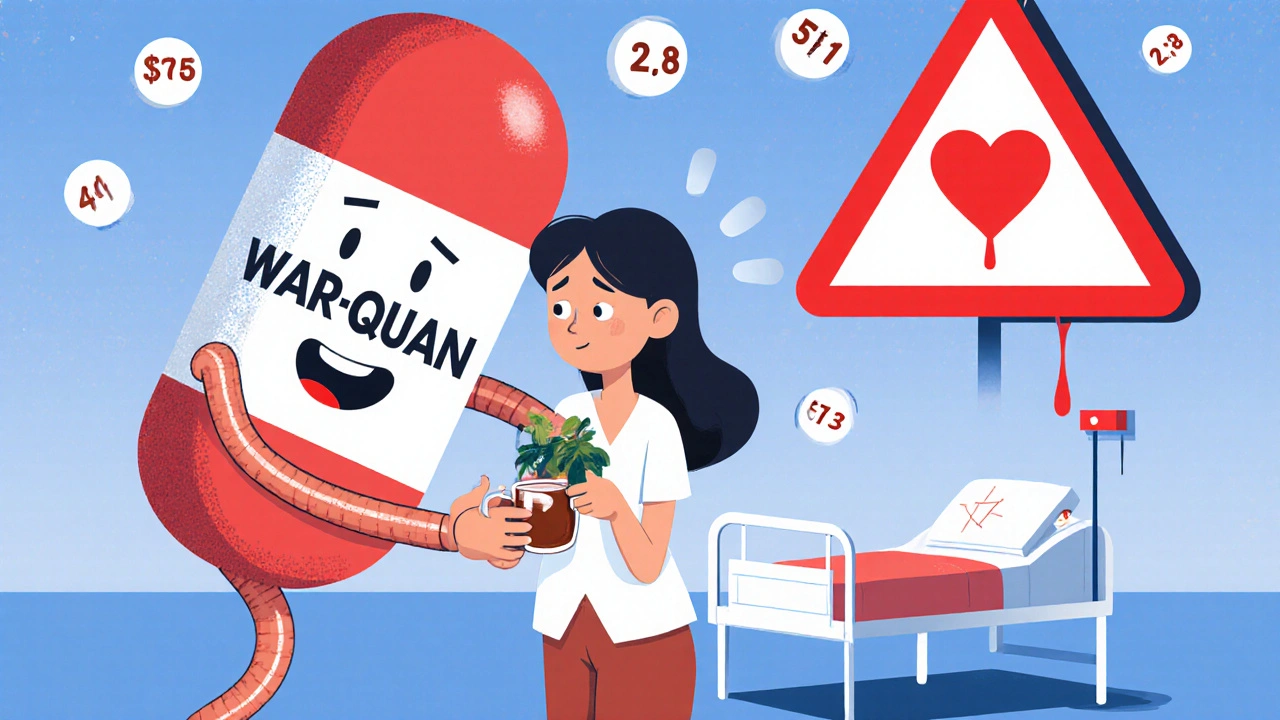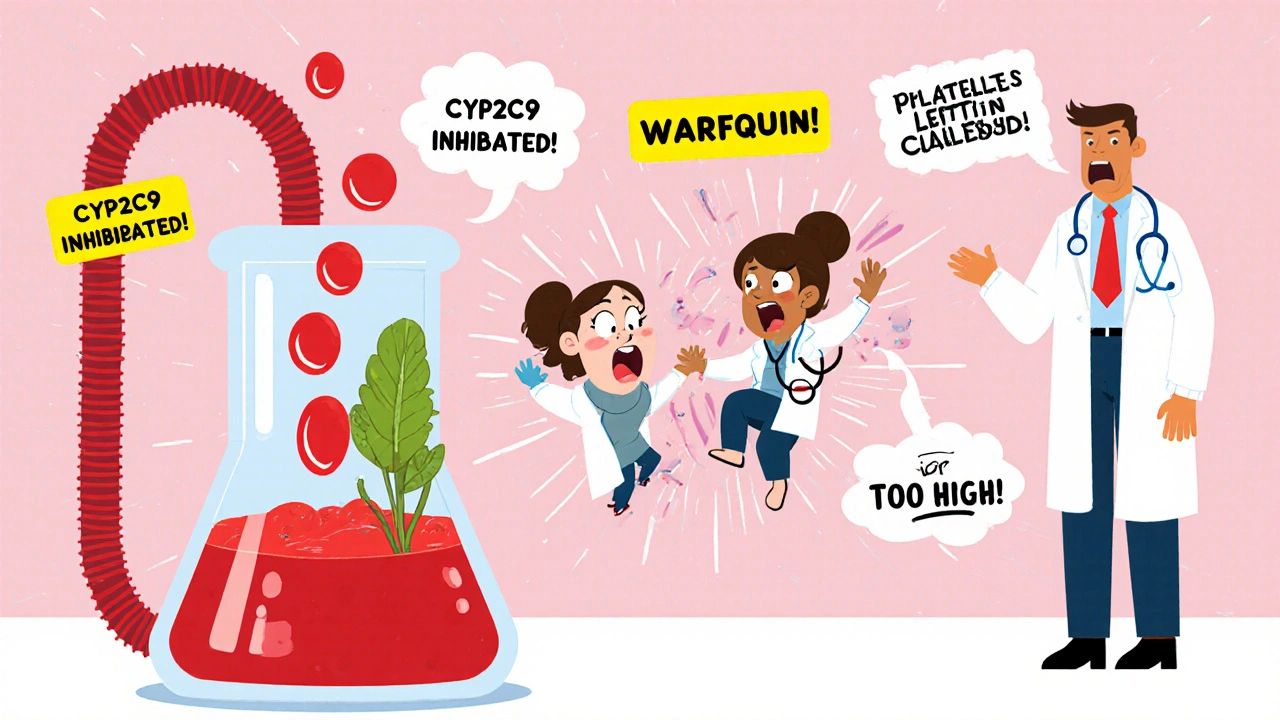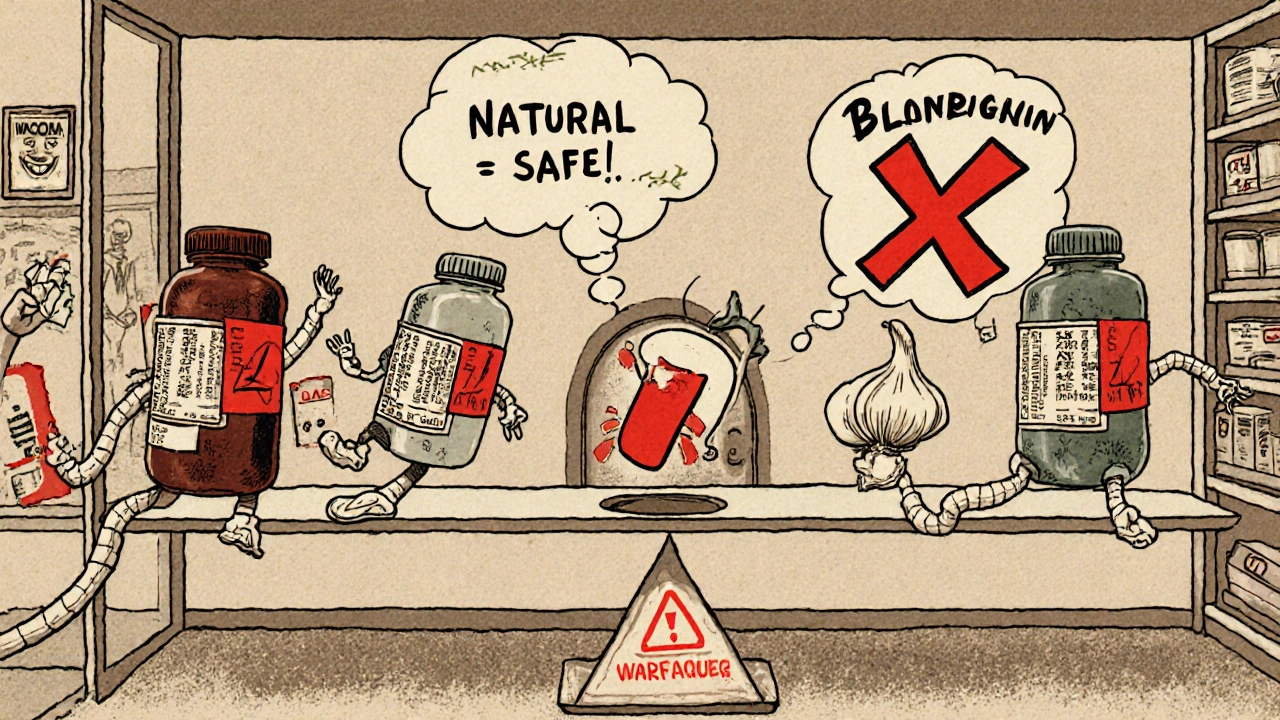
Warfarin & Dong Quai Risk Calculator
Bleeding Risk Assessment
This tool estimates how Dong Quai might affect your warfarin treatment based on your current INR level. Remember, Dong Quai significantly increases bleeding risk when combined with warfarin.
If you're taking warfarin to prevent blood clots, and you're thinking about using Dong Quai for menopause, cramps, or general wellness, you need to stop and think again. This isn't just a "maybe" interaction-it's a well-documented, potentially dangerous combination that can push your blood too thin, leading to serious bleeding. Even if you've been told herbal supplements are "natural" and therefore safe, Dong Quai and warfarin together can land you in the emergency room.
Why This Interaction Is Real and Dangerous
Warfarin is a blood thinner with a very narrow window of safety. Your doctor carefully adjusts your dose to keep your INR between 2 and 3-high enough to prevent clots, but low enough to avoid spontaneous bleeding. Now add Dong Quai, a traditional Chinese herb often marketed as a "female ginseng," and things get risky fast.Dong Quai doesn’t just "maybe" thin your blood. It contains compounds like ferulic acid and osthole that directly inhibit platelets, the cells your body uses to stop bleeding. This means it works the same way as aspirin or fish oil-but without the safety testing. When you take it with warfarin, the effects add up. Your body isn’t just getting one blood-thinning agent; it’s getting two, working in different ways, with no clear limit on how strong the combo gets.
It’s not theoretical. In 2023, a patient on Reddit reported their INR jumped from 2.8 to 5.1 after starting Dong Quai for hot flashes. That’s not a small change. An INR above 4.0 means your risk of internal bleeding-like a brain bleed or stomach hemorrhage-goes up sharply. This patient had to be hospitalized. And they weren’t alone. HealthUnlocked forums show over two dozen cases between 2020 and 2023 where unexplained INR spikes were traced back to Dong Quai use.
How It Works: More Than Just One Mechanism
You might think the problem is just that Dong Quai contains coumarin, like warfarin, so they’re similar. But it’s more complicated-and more dangerous.First, Dong Quai has direct antiplatelet effects. It makes your platelets less sticky, so clots form slower. Warfarin works differently: it blocks vitamin K, which your liver needs to make clotting factors. So you’ve got two separate systems being hit at once.
Second, there’s evidence Dong Quai may interfere with how your liver breaks down warfarin. It can inhibit enzymes like CYP2C9 and CYP3A4, which are responsible for clearing warfarin from your body. If those enzymes slow down, warfarin sticks around longer. That means even if you take your usual dose, your blood ends up thinner than expected. One study showed this could extend warfarin’s half-life from 40 hours to over 80 hours in some people.
Third, Dong Quai has estrogen-like effects. That’s why some women use it for menopause. But if you have a history of breast cancer or other hormone-sensitive conditions, this adds another layer of risk. Memorial Sloan Kettering warns that Dong Quai can stimulate the growth of estrogen-receptor-positive tumors in lab studies. So even if you avoid the bleeding risk, you might be creating a different one.
What the Experts Say
Major medical institutions don’t mince words about this interaction.The Cleveland Clinic says: "Avoid Dong Quai in warfarin-treated patients due to lack of data." That’s not a suggestion-it’s a warning. They list it alongside ginkgo, garlic, and ginger as high-risk herbs for people on blood thinners.
The University of California San Diego explicitly marks Dong Quai with an upward arrow (↑) under "Increased Risk of Bleeding," alongside fish oil and turmeric. Their guidelines say: if you start or stop Dong Quai, check your INR within 3 to 5 days. Why? Because the change can happen fast.
Dr. Catherine Ulbricht, a top pharmacist and researcher at Massachusetts General Hospital, says the risk isn’t just possible-it’s predictable. "Dong Quai can push an INR from 2.5 to over 4.0 without any change in warfarin dose," she says. That’s not a fluke. That’s a pattern.
The American Heart Association calls Dong Quai a "high-risk herb" for anticoagulated patients. The American College of Cardiology includes it in the same category as St. John’s wort and ginkgo biloba-herbs with "established or probable interaction risk."

Why People Still Take It
So if the risks are this clear, why do people still use it?Because they don’t know. A 2022 survey by the National Center for Complementary and Integrative Health found that 68% of people taking warfarin had no idea herbal supplements could interfere with their medication. Many assume "natural" means "safe," or that if it’s sold in a health store, it’s been approved.
Also, Dong Quai is easy to get. It’s sold as capsules, teas, tinctures, and even in multi-herb blends labeled as "women’s health formulas." The label rarely says "May increase bleeding risk"-and even if it does, most people skip reading the fine print. The U.S. doesn’t require supplement labels to prove safety or interactions before selling them, thanks to the 1994 DSHEA law.
And the market is growing. Sales of Dong Quai in the U.S. rose 14.2% annually between 2020 and 2022, even as awareness of the interaction increased. People want relief from menopause symptoms, and Dong Quai feels like a gentle, traditional solution. But it’s not gentle when paired with warfarin.
What to Do If You’re Taking Both
If you’re on warfarin and already taking Dong Quai, don’t quit cold turkey. Sudden changes can also cause problems. Talk to your doctor or pharmacist first.Here’s what you should do:
- Stop taking Dong Quai immediately, unless your provider says otherwise.
- Get your INR checked within 3-5 days of stopping it. The effect can linger for days.
- Don’t restart it without medical supervision. Even if you stop for a while, restarting can cause another spike.
- If you’re using it for menopause symptoms, ask your doctor about safer alternatives. Black cohosh, red clover, or low-dose hormone therapy may be better options-with proper monitoring.
If your doctor says you must use Dong Quai (which is rare), they’ll likely reduce your warfarin dose by 15-25% and monitor your INR twice a week for the first month. But this is not standard practice. Most providers will just say: avoid it.

What About Other Supplements?
Dong Quai isn’t the only herbal risk. In fact, it’s one of 90 Chinese herbs known to interact with anticoagulants. Others include:- Ginkgo biloba - increases bleeding risk by affecting platelets
- Garlic - inhibits platelet aggregation
- Ginger - similar antiplatelet effect
- Feverfew - can cause bleeding, especially before surgery
- Fish oil - high doses (over 3g/day) may increase INR
- Turmeric - curcumin interferes with clotting pathways
Many people take these without realizing they’re all in the same risk category. If you’re on warfarin, you need to review every supplement-vitamins, minerals, herbal blends-with your provider. Even something as simple as a "daily multivitamin" might contain vitamin K, which can make warfarin less effective. It’s not just about avoiding Dong Quai-it’s about knowing what else could be hiding in your medicine cabinet.
What’s Being Done About It?
The problem is getting attention. In January 2025, the European Medicines Agency will require all Dong Quai products sold in EU countries to carry a warning about warfarin interactions. In the U.S., the FDA has received over 140 reports of herbal-anticoagulant adverse events since 2018, though only a fraction name Dong Quai specifically.Research is also moving forward. A $2.1 million NIH-funded study at the University of Illinois is currently tracking how Dong Quai affects warfarin levels in 120 volunteers. Results are expected in late 2024. Until then, we rely on what we already know: the interaction is real, it’s dangerous, and it’s preventable.
Bottom Line
Dong Quai and warfarin don’t mix. Not because one is "bad" and the other is "good." But because together, they can make your blood too thin-too fast-and without warning. The science is clear. The warnings are out there. The cases are documented.If you’re on warfarin, skip Dong Quai. Period. If you’re considering it for symptoms like hot flashes or irregular periods, talk to your doctor about safer, evidence-based alternatives. Your next INR test shouldn’t be a surprise. And your next hospital visit shouldn’t be because you thought a herbal tea was harmless.
When it comes to blood thinners, natural doesn’t mean safe. It means you need to be smarter.
Comments (11)
-
Ganesh Kamble October 31, 2025So let me get this straight - you're telling me that a herb my grandma used for cramps is now a death sentence if I'm on warfarin? Cool. I'll just keep drinking chamomile tea and hope my blood doesn't turn into water. 🤷♂️
-
Jenni Waugh October 31, 2025Oh sweet mercy. Another person thinks 'natural' means 'FDA-approved.' Let me grab my monocle and gasp dramatically. Dong Quai? In 2025? Honey, if you're still swallowing herbal snake oil because it 'feels spiritual,' you're one INR spike away from a transfusion. Get a grip.
-
Theresa Ordonda November 1, 2025I can't even with this. 🙄 I had a friend who took Dong Quai for 'hormone balance' and ended up in the ER with a GI bleed. Her doctor was furious. She said she 'didn't read the label' - as if the bottle had a tiny warning in 2pt font next to 'Contains Potassium.' Newsflash: if it's sold next to crystals and sage, it's not a vitamin. 🚨
-
Judy Schumacher November 3, 2025The profound negligence exhibited by the American consumer regarding pharmacological interactions is nothing short of catastrophic. The assumption that botanical substances, by virtue of their origin in soil and sunlight, are inherently benign, represents a fundamental epistemological failure of public health literacy. Dong Quai, in conjunction with warfarin, constitutes a pharmacodynamic synergy of alarming magnitude - one that, in clinical practice, is not merely theoretical, but empirically recurrent and clinically actionable. One must question: how many more lives will be sacrificed on the altar of pseudoscientific wellness culture before regulation intervenes?
-
Megan Raines November 4, 2025Wait - so you're saying I can't have my 'menopause magic tea' and live to 80? I mean, I get it. But why does every single thing that helps me feel human also want to kill me? 🤔
-
Lorne Wellington November 6, 2025Hey everyone - if you're on warfarin, just make a list of everything you take, even that 'just one capsule' supplement. Bring it to your pharmacist. They'll scan it in 30 seconds and tell you if it's a landmine. Seriously. Pharmacies are there for this stuff. No judgment. I used to take turmeric for my knees - turned out it was bumping my INR. Now I use physical therapy. Safe, effective, no ER visits. You got this 💪
-
Will RD November 7, 2025i just took dong quai for a week and my INR went to 4.5 and i didnt even know it was a thing. my doc was mad. now im scared to take anything. why does no one warn you? 🤦♂️
-
Jacqueline Anwar November 7, 2025This is the exact reason why we cannot allow unregulated supplements to flood the market. The negligence of individuals who prioritize anecdotal wellness over evidence-based medicine is not just irresponsible - it is morally indefensible. You are not just risking your life; you are burdening the healthcare system with preventable crises. Shame.
-
Mamadou Seck November 7, 2025So dong quai is like nature's aspirin but without the warning label and with extra side effects of your organs turning into jelly? Cool. I'll just keep taking it and hope for the best. Who needs a doctor anyway? 🤷♂️
-
Anthony Griek November 8, 2025I'm from Canada and we have the same problem here. People buy herbal stuff at the grocery store like it's cereal. I told my aunt to stop her 'women's blend' after she started bleeding from her gums. She said it was 'just a little tea.' I'm still waiting for her to get her INR checked. We need better labeling. Simple.
-
Norman Rexford November 10, 2025Man I love how America lets you sell poison as tea. China's been using this stuff for centuries. Now you're scared because you don't know what you're doing? That's not the herb's fault. That's your fault for not knowing your own body. Get educated or stay off the internet. 🇺🇸🔥
